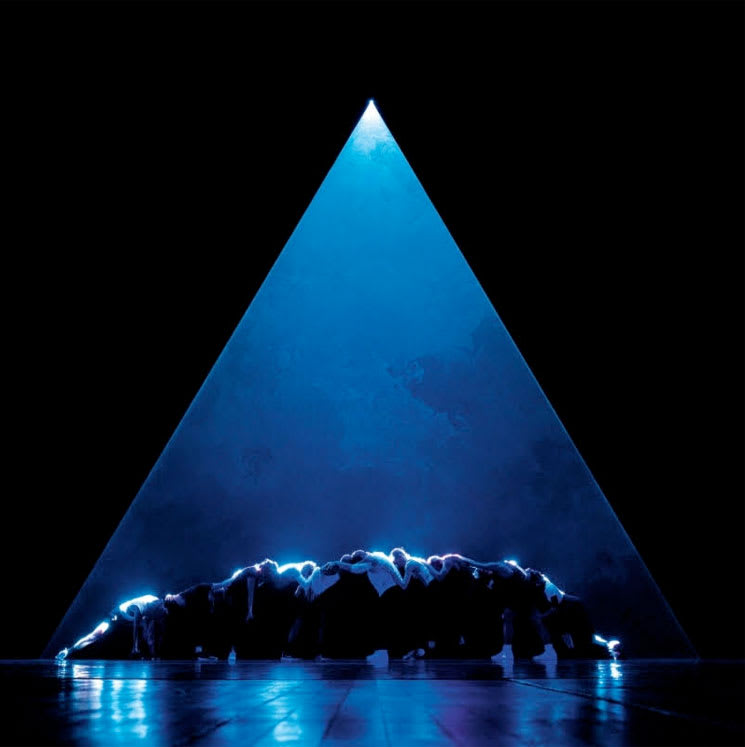In writing a score for dance performance, Montreal's Fly Pan Am also have succeeded in wrapping back around to their origins just over two decades ago. Along with Godspeed You! Black Emperor and Do Make Say Think, the four piece formed the early core of Constellation Records' lineup. Their earliest releases featured an aggressive blend of progressive rock, Krautrock, minimalism, noise and just a slight dusting of Franco-pop. They often relied on tension that came from opening wide melodic spaces to draw in the listener before locking the door behind them and indulging very extended repetitive sections drawn from the Tony Conrad and Dream Syndicate playbook.
Though Fly Pan Am went on hiatus in 2005, band members' participation in projects such as Feu Thérèse and Avec Le Soleil Sortant De Sa Bouche kept the Fly Pan Am sound fueled and ready, so that when the group reunited to play a one-off show in 2018, a new album quickly followed the next year. C'est ça found the group unlocking structures they'd left standing 15 years previously, armed with a modern arsenal of electronics and a skilled producer in the form of Jerusalem in My Heart's Radwan Moumneh. Their signature sound was immediately recognizable, but harder and leaner in performance and with a willingness to use the studio as an instrument, finding tension this time in the edits as much as the interplay.
New album Frontera was born out of a collaboration between the band and choreographer Dana Gingras from Montreal's Animals of Distinction troupe. In the liner notes, Gingras describes the project's focus as a counter to "an advancing frontier of knowledge and control, monitoring movement, defining identities and gathering data." Workshopped with the band and the ensembles' ten dancers, the project eventually premiered in November of 2019, with Fly Pan Am as a live band onstage for the performance.
The group haven't really deviated from their basic process in crafting this score, however either by design or irony, there are definite boundaries in place that help express the themes but also restrict the musical palette. The two most definitive elements are Félix Morel's drums functioning as both mood and metronome for the bulk of the pieces, and field recordings lending a blurring effect to harder edges in the sound. The temperament of the album swings from straight line certitude expressed with a degree of anger, especially in Jean-Sébastien Truchy's metal-adjacent vocal moments, to a less-definitive exhalation of energies not quite at rest but renewing.
It is a well-conceived and delivered piece of work, but perhaps unavoidably one that feels the absence of its staged elements. The success of the music is marked by the suggestion of spaces left open for reactions and intersections by the dancers and technical direction of the larger production. It does function as a standalone album, perhaps, but not entirely dance-alone.
(Constellation)Though Fly Pan Am went on hiatus in 2005, band members' participation in projects such as Feu Thérèse and Avec Le Soleil Sortant De Sa Bouche kept the Fly Pan Am sound fueled and ready, so that when the group reunited to play a one-off show in 2018, a new album quickly followed the next year. C'est ça found the group unlocking structures they'd left standing 15 years previously, armed with a modern arsenal of electronics and a skilled producer in the form of Jerusalem in My Heart's Radwan Moumneh. Their signature sound was immediately recognizable, but harder and leaner in performance and with a willingness to use the studio as an instrument, finding tension this time in the edits as much as the interplay.
New album Frontera was born out of a collaboration between the band and choreographer Dana Gingras from Montreal's Animals of Distinction troupe. In the liner notes, Gingras describes the project's focus as a counter to "an advancing frontier of knowledge and control, monitoring movement, defining identities and gathering data." Workshopped with the band and the ensembles' ten dancers, the project eventually premiered in November of 2019, with Fly Pan Am as a live band onstage for the performance.
The group haven't really deviated from their basic process in crafting this score, however either by design or irony, there are definite boundaries in place that help express the themes but also restrict the musical palette. The two most definitive elements are Félix Morel's drums functioning as both mood and metronome for the bulk of the pieces, and field recordings lending a blurring effect to harder edges in the sound. The temperament of the album swings from straight line certitude expressed with a degree of anger, especially in Jean-Sébastien Truchy's metal-adjacent vocal moments, to a less-definitive exhalation of energies not quite at rest but renewing.
It is a well-conceived and delivered piece of work, but perhaps unavoidably one that feels the absence of its staged elements. The success of the music is marked by the suggestion of spaces left open for reactions and intersections by the dancers and technical direction of the larger production. It does function as a standalone album, perhaps, but not entirely dance-alone.
